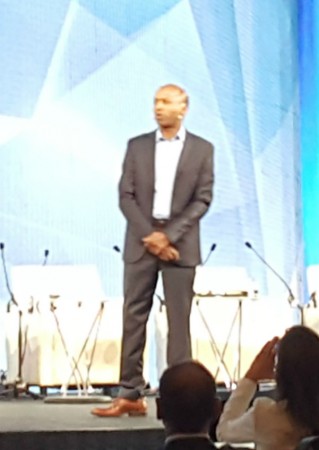Co-ops help people live better with less, according to innovation adviser, Navi Radjou, who joined delegates at the International Summit of Cooperatives in Quebec. The biennial event, which this year took place on 11-13 October, brings together business leaders, researchers and decision makers from across the world.
Mr Radjou is a strategic consultant based in Silicon Valley and has written extensively about the concept of frugal innovation. He describes it as the ability of businesses to create high quality products with limited resources. His books, Jugaad Innovation and From Smart to Wise have become international bestsellers. In his presentation at the Summit he shared some of the case studies used in his next book, which will focus on how to live better with less.
Growing up in Pondicherry, a former French colony in India, Mr Radjou said he had faced water scarcity and lacked essentials. Co-ops were playing an important role in the community’s economic life at the time, he said.
After emigrating to the West, he experienced abundance. “If you look at history of humanity, we are moving from scarcity to abundance,” he said, questioning whether “more” meant “better”.
“Increase in material prosperity has lifted millions off poverty,” he said, “but individual, social and planet well-being, have they increased? Material prosperity is increasing but only by a few. The number of billionaires has increased but for a typical household, income has not increased. Even in Europe, 50 million people live below poverty line.”

There are other problems too, he said. While life expectancy has increased to 70, the number of people living with chronic diseases has also increased. And according to a Gallup poll, 87% of the global workforce is disengaged.
“Planet well-being is also beginning to suffer – we are over-consuming natural resources,” he said.
“Focusing on earning more does not make you happier necessarily. More spending doesn’t make things better. We need to ask what kind of growth do we want? More or better?”
Mr Radjou questioned the tendency to use gross domestic product as an indicator of growth. “It excludes people and depletes natural resources,” he said. By frugal he means growth that gives back as much as it takes from society.
“It has to be inclusive, rather than excluding people,” he told delegates. “A frugal society is an open and co-operative social ecosystem that focuses on quality.”
The idea draws on the work of Erich Fromm, author of the book To Have or to Be.
“Human beings tend to look at the glass as half empty. But if you look at it as half full, you can build an appreciative culture and discover resources you were not even aware of,” said Mr Radjou. He gave the example of M-PESA providing mobile financial services to African remote communities, which do not have access to banking services, but have a mobile phone.
He encouraged delegates to shift from being passive consumers to active producers or ‘prosumers’. In Freiburg, German citizens generate their own electricity while in Seattle, USA, local citizens grow food.
The growing interdependence will also transform the economic life, which means mutuality will play a greater role, he said, and encouraged co-ops to update their values in line with existing technology.
“Co-operatives form the bedrock of this society,” he said “but for that to happen you have to come out from your shelf, actively engage with other sectors in order to co-create a frugal society.
“Change the operating system because hardware is very solid.”
- For more of our coverage of the International Summit of Co-operatives, visit thenews.coop/summit.

